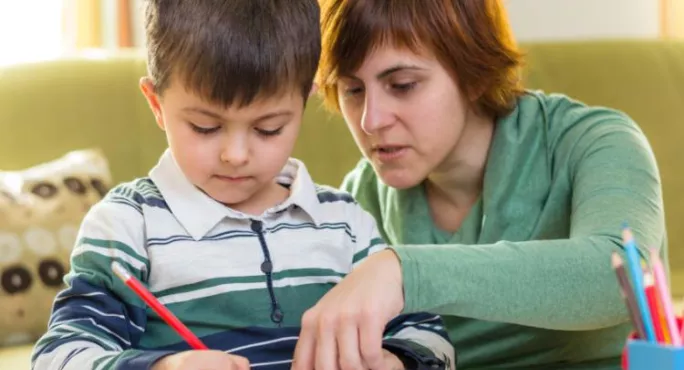- Home
- ‘Early years is not “just play”. As the beginning of their school journey, it sets children up for life’
‘Early years is not “just play”. As the beginning of their school journey, it sets children up for life’

A quick new year’s quiz for you.
Daisy is a five-year-old, just starting her second term of Reception, who is having trouble with adding.
Do you:
(a) not worry too much because she has loads of time to figure out numbers (it’s only Reception, for heaven’s sake!)
(b) get the best maths teacher in the school to sort out her concept of numbers immediately.
(c) do one of the other hundred or so pressing things you have to do?
If, as a teacher, you chose (b), which you would probably have wanted to do anyway (given world enough and time), there is evidence to suggest that you are setting that child up for life. At least from the perspective of academic performance - although it’s worth noting that an early boost to academic confidence might also suffuse multiple other areas. Certainly, a study published at the end of last year identified a strong correlation between effective teaching in Reception and later academic outcomes.
This will not come as a surprise to Reception teachers. And probably not to those engaged in tracking pupil performance in all-through settings. But I wonder how many parents realise just how important a child’s first year of schooling is.
Most of my non-teaching friends think of it as “just play”, whatever “just play” means. When I remonstrate with arguments about the sophistication of a four- or five-year-old and the elaborate structures of role-playing, imaginative flight and independence-building that take place, I am largely pooh-poohed. There is simply a conceptual leap that is missing (maybe they can’t think back that far). However, tying what goes on in Reception to GCSE outcomes might just focus their minds.
I mean, everyone from Plato to Sir Ken (as in the great Robinson, in Creative Schools) talks of the critical importance of supervising and nurturing the first steps, bringing up young shoots, etc, etc, but it’s all too easy to ignore or think about later, when real worry about high-stakes exams kicks in. Plato, after all, did not have to worry about reformed linear A levels.
The importance of good foundations has parallels in everything from building to make-up - so let’s look at another concrete (as it were) example.
“Grandma, three and seven isn’t 10! It’s 37,” said Ellie, another child in the Reception class, “and two and two isn’t four! It’s 22.”
Now this case is slightly special, as the collecting grandmother, who heard this, happens to be a maths specialist and was quickly able to sort out her granddaughter’s confusion with some blocks at home. Indeed, this girl could count to 20 at nursery and had been playing with concrete maths resources ever since she could crawl.
Building-blocks of learning
It is striking, though, or perhaps inevitable, how easily such a difficulty or misconception can occur. The class teacher might well have got to it themselves at some point as well - we shall never know - but one wonders how many other children in the class were confused or struggling with number or place value.
And it is so important to get it right. Concepts of numbers, much less shape and pattern, are themselves like “blocks” in the construction of understanding. A shaky or crumbling block in the foundations can have all too predictable consequences.
One thing that clearly does make a difference, and that the aforementioned research paper called for explicitly, was to have very good teaching on hand as early in schools as possible. Just one of many examples I could cite from my own experience at the Girls’ Day School Trust is the current Reception teacher at Newcastle High School for Girls. A former headteacher and early years specialist has transformed the whole look and feel of the setting with a natural palette of materials, a redesign of free-flow stations, participative displays and an endless array of exploratory stimulation. They also have the best mud kitchen in the GDST.
What she and her team have created is a tangible culture of possibility in nursery and Reception - the sort of atmosphere in the place that makes a visitor (much less children) not want to leave.
In another setting, at Royal High School in Bath, one of the school’s most experienced teachers runs the nursery. Last year, I saw a lesson outside (on a rocket ship to Mars!) that was electrifying in its hold on the imagination and in its sheer joy - the children could not have been more involved and excited, with a minimum of props but a mighty dose of imaginative engagement.
It is certainly the kind of “play” scenario that I would want for my own children, much less as a teacher or a school leader. And as parents wake up to the importance of that first year of schooling, I imagine they might want the same.
For while Plato might not have had to struggle with exam reform, he might possibly have known a thing or two about childhood:
“With anything young and tender, the most important part of the task is the beginning of it; for that is the time at which the character is being formed and the desired impression more readily taken.” Plato, The Republic, as quoted in Quiet, Susan Cain (2013).
Will Wareing is deputy director, education, at the Girls’ Day School Trust
Want to keep up with the latest education news and opinion? Follow Tes on Twitter and like Tes on Facebook
Keep reading for just £1 per month
You've reached your limit of free articles this month. Subscribe for £1 per month for three months and get:
- Unlimited access to all Tes magazine content
- Exclusive subscriber-only stories
- Award-winning email newsletters
